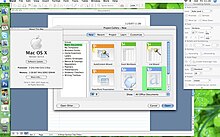
Back روزيتا (برمجيات) Arabic Rosetta (Apple) German Rosetta (software) Spanish Rosetta (logiciel) French Rosetta (software) Italian Rosetta Japanese 로제타 (소프트웨어) Korean Rosetta (Apple) Dutch Rosetta (oprogramowanie) Polish Rosetta (программное обеспечение) Russian
 Microsoft Word for PowerPC on Intel | |
| Developer(s) | Apple Inc. |
|---|---|
| Operating system | Mac OS X 10.4.4–10.6.8 (Intel) macOS 11.0–present (ARM) Linux guest[1] |
| Type | Binary translation, emulation |
| Website | https://support.apple.com/en-us/102527 |
Rosetta is a dynamic binary translator developed by Apple Inc. for macOS, an application compatibility layer between different instruction set architectures. It enables a transition to newer hardware, by automatically translating software. The name is a reference to the Rosetta Stone, the artifact which enabled translation of Egyptian hieroglyphs.[2]
The first version of Rosetta, introduced in 2006 in Mac OS X Tiger, was part of the Mac transition from PowerPC processors to Intel processors, allowing PowerPC applications to run on Intel-based Macs. Support for Rosetta was dropped with the release of Mac OS X Lion (10.7) in 2011.
Rosetta 2, introduced in 2020 as a component of macOS Big Sur, is part of the Mac transition from Intel processors to Apple silicon, allowing Intel applications to run on Apple silicon-based Macs.[3]
- ^ "Running Intel Binaries in Linux VMs with Rosetta". Apple Inc. Retrieved August 7, 2022.
- ^ Norr, Henry (January 27, 2006). "Core Duo iMacs debut speedy new chips". Macworld.
- ^ Warren, Tom (June 22, 2020). "Apple is switching Macs to its own processors starting later this year". The Verge. Retrieved June 22, 2020.